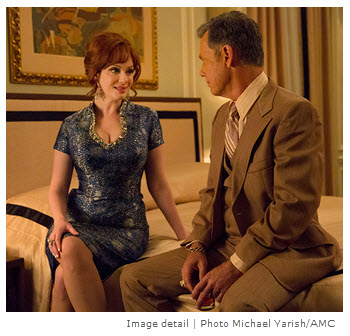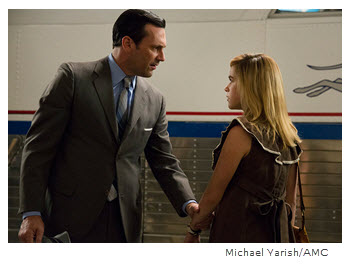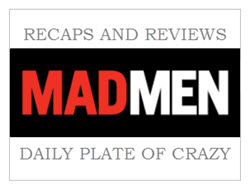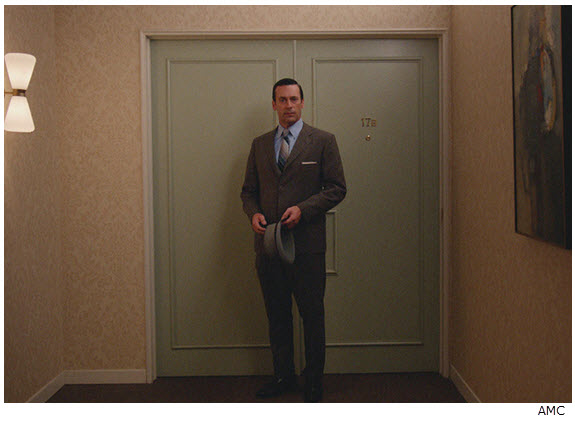Just how disturbing is it that Don Draper cannot imagine the future — and he isn’t the only one? Peggy is in the same boat to a degree, and likewise Ted, though neither of them seems concerned. Might Matthew Weiner in his own way be having a little macabre fun with us because in a few short weeks, it’s curtains for Mad Men?
 Of course, Peggy can foresee herself as the first female creative director at the agency, and Ted is hoping to land a pharmaceutical company. Sally’s friends are a mixed bag — creepy Glenn is headed to Vietnam where he’s likely to be killed, two of Sally’s pals want futures in politics, and Sally herself just wants not to become her father or her mother.
Of course, Peggy can foresee herself as the first female creative director at the agency, and Ted is hoping to land a pharmaceutical company. Sally’s friends are a mixed bag — creepy Glenn is headed to Vietnam where he’s likely to be killed, two of Sally’s pals want futures in politics, and Sally herself just wants not to become her father or her mother.
Meanwhile, Don knows the future should hold something beyond bucks and billings, but he can’t articulate what that is.
Even Betty mentions her plans — going back to school — and Joanie wants love, a man, and to enjoy where she is “in the job she’s always wanted.”
These ladies have more of a sense of direction than the men, including Joan’s new love interest who now wants to float through life in his fantasy freedom. His situation, to me, is a different animal. His choice is a future of self-interest and exploration having “done the right thing,” which is not the same as being unable to envision a future whatsoever, or to be so myopic as to see only the next client or the next promotion.
Another bit of irony — Joan is interviewing people in Lou’s LA office where he, on the other hand, continues to hang on to his dream of bringing his comic characters to life. Mr. No Personality seems able to chase what he wants!
Don’s Mission: What Does the Future Hold?
The key theme of this episode of course is the mission that Roger hands over to Don. He needs a 2500 word statement on the company’s future for McCann. Don is tasked with writing it.
But he can’t.
Try as he might, he is unable to imagine anything beyond the daily grind. He’s stymied by this need to look into the future, and as he says standing in his empty apartment – it’s great to have imagination – yet his has evaporated when it comes to his own next chapter.
Recognizing that the business is running relatively smoothly, he muses:
As good as it is, is there a scenario in which it is better?
This is a fantastic line, as it encapsulates how Don seems to be slightly ill at ease when things are going well. Moreover, advertising is always about creating a sense that things could be better through a new product or service. And yet Don seems to be the only one grappling with the larger issue of a better life, or whatever comes next…
Don, Hat in Hand and Perplexed
How many times in the past few episodes have we noted Don standing hat in hand with a somewhat bewildered – even constipated – look on his face? And I use both terms intentionally. Our existentially-challenged hero has no anchors, no palm-sweating heart-stopping identity crisis to propel him forward, no wife or serious love interest to give him a sense of belonging, much less drama to deal with.
What does he have? Who does he have?
The agency of course, but he hardly seems involved — all that “thinking” rather than doing.
Nothing but a tenuous relationship with his children, distance despite his efforts to reach out to them.
And no creative work — only cleaning up others’ messes, or trying to — as with Mathis.
As for the hat in hand, it seems to symbolize apology or deference, and on Don, it looks like defeat. And no more so than when standing hat in hand behind Megan at the attorney’s office, or hat in hand alone in his empty penthouse living room after Marie cleans him out, or beyond the doors of his apartment, which he can no longer imagine to be any sort of home as a couple inside are signing the papers to buy it.
The Color Green
Joanie is a knock-out in more ways than one throughout this episode. She’s smart, confident, accomplished and enjoying herself. She’s also drop-dead gorgeous, and wearing green in numerous scenes with the exception of a ferociously flirty pink outfit (when she meets her new man, Richard) and an elegant blue dress when he decides he needs to part.
She’s in a green nightgown as the episode opens, and a satiny emerald-hued robe later that evening. In the office, she is in a dark green ensemble – polka dots and solids. In one other scene, she wears a solid blue dress — form-fitting and stunning.
Don’s real estate agent Melanie is wearing a kelly green with white outfit as she tries to sell Don’s apartment. And she rather neatly matches the (green and white) lawn furniture he pulled off the terrace into the living room!
And with green the color of hope (and fertility and the future?), haven’t the Mad Men costumers had their (agreeable) way with us once again?
Betty, Glenn and Vietnam
Creepy Glenn’s reappearance, and the news that he is headed to Vietnam, reminds us that death is around the corner; the tumultuous 1960s have led to a new decade in which the war continues to rage.
The scenes between Betty and Glenn are disturbing; she enjoys his attention (and Sally notices and is disgusted), and she seems to dismiss the likelihood that the 18-year-old will be killed.
What she’s worried about? That he may have joined the Army to impress her in some way. Sadly, he did so because he flunked out of school and he wanted to please his step-father.
Ah, the generational love-hate relationship… The things we will do to gain the approval of a parent, or at least to stem the tide of disapproval.
Sally’s response to Glenn’s news is wrenching. It seems that Sally is saying a lot of goodbyes (in the face of imminent death?) — real and symbolic.
Don’s Goodbyes?
There was something both poignant and anxiety-provoking as Don drops Sally and friends at the Greyhound station for her “teen tour.” Sally is understandably miffed at her mother’s flirting with 18-year old Glenn, and her father’s polite response (that she misinterprets) to her 17-year-old friend’s flirting with him.
Mathis (who wins the Dunce of the Month Award) hits a sore spot when he screws up big with a client. He knows he’s going to be fired and he takes his mistake out on Don: He’s “just handsome” and that’s why he gets his way. Of course, the intrepid ad man is much more – or has been.
Hmm. Did I just place Don Draper and “has been” in the same sentence?
Don seems to be seeing happenings around him clearly, albeit not his own future. As Sally mouths off at the station, his remarks to his adolescent daughter are insightful. As much as she might want not to become her parents – she is and will be like them in some ways – but she can be more.
As he waves goodbye to the bus, it’s hard not to feel the pang of any parent as they come to understand their future is shorter, their child’s just beginning, and they may not be around to see much of what lies ahead. Besides, Dick’s world is deserted — no parents (for better or worse), no brother (dead), no Megan (departed), no Rachel (dead), no waitress Di (departed), none of the other women he bedded much less the one he first married.
Contemporary Story Lines
The exchange between Joan and Richard, and the way their encounter plays out, strikes me as relevant 45 years later — without the upbeat twist in the plot at the end. I’ve lived my own version of this interaction numerous times as a divorced woman with young children.
When Richard tells Joan what he wants, he explains in the context of his own 22 year marriage and subsequent split:
I stayed in for the kids, and when my youngest graduated and I saw her heading off to Europe I thought… jeez, that looks good.
He relates how he built a lot of things, but he also put off a lot of things and now he’s free as a bird. Initially, Joan doesn’t mention her four-year-old child, and when Richard follows her to New York wanting a relationship, then learns that she has a young boy, he wants out — just as they are beginning.
He exits gracefully, but he doesn’t want to do it all over again.
For yours truly, I’m remembering of 2003, 2004, 2005, 2006, 2007, 2008… I’ll stop there, thank you very much. The men my age or a few years older wanted nothing to do with a woman who still had young children, or for that matter, teenagers to raise.
 Observations
Observations
Say hello to 70s Style, if you can call it that. Shall we all raise a glass to Richard’s arrival in Manhattan in a powder blue leisure suit? How about those long, pointy collars? Very Six Million Dollar Man!
Other sightings of polyester were seen… I simply cannot bring myself to discuss them.
Invited into the Francis manse in this episode, may I say how much I detest those dark, brooding interiors? What drugs is Betty on that she can tolerate that place? Where has she hidden her 1960s fainting couch?
And let’s hear it for Sally whose exchanges with Betty are deliciously sarcastic, and later with Glenn, painfully real as he tells her he’s headed to Vietnam and she blurts out: “Are you fucking stupid? You’re gonna die — for what?” Betty, on the other hand, says he’s grown into a fine young man. She shakes his hand and says “we’ll see you when you get back; Sally, too.”
Cue the later attempted groping by Glenn, and Betty’s deft (or indifferent?) handling. So what do you think – will she make a good shrink or a lousy one?
Peggy’s Professional Forecast Only
Peggy marches into Don’s office and informs him that Ted told her to complete her own review. She says: “I want my performance reviewed. I’ve had quite a year.”
But Don has other ideas. He wants to know what she sees for the future. He’s trolling for something to say in this visionary speech that is leading to utter blindness.
Peggy composes herself. She says “I’d like to be the first woman creative director at this agency.”
Don: “Let’s say you get that. What’s next?”
Peggy: “Land something huge.”
Don: “What else?”
Peggy: “I don’t know.”
Don: “Yes you do.”
Peggy: “Create something of lasting value.”
Don: “In advertising…”
Peggy, angrily and leaving: “Why don’t you just write down all your dreams so I can shit on them.”
Great line!
After 1970… What’s Next?
So… Is Peggy as emotionally stunted as her boss, or simply focused on her professional future as the context of the discussion, or so she thought, is her performance review? And Don’s response to “create something of lasting value” – isn’t that what he’s trying to find and cannot, as he draws a blank on writing the future?
As the episode closes, Don walks into his apartment – a very pregnant woman and man are signing something. He’s ushered out quickly by the real estate agent who says “now we have to find a place for you.”
Another great line!
Is Matt Weiner cooking up some Next Big Thing for the Don Draper character? Just another typical Weiner Teaser?
Standing outside his own place, without human connection, unable to forecast in any tangible way, Don seems small, lost, and he’s standing with his hat in hand. He’s ready for a curtain call.
And where are we, the audience? What do we see after all the struggle and turmoil?
Dick became Don. They seem to have integrated identities and created a life, though it appears lacking in “lasting value.” And though we would like to believe otherwise, we cannot imagine our hero stepping into 1971.
Click images to access originals at AMC TV.
 Be sure to check Mad Men Reviews weekly, or bookmark Entertainment / Mad Men.
Be sure to check Mad Men Reviews weekly, or bookmark Entertainment / Mad Men.
You May Also Enjoy

What about the playing of “The First Time Ever I Saw Your Face,” as sung by Roberta Flack, during the last scene with Don standing outside the front door of his newly-sold apartment? I have been too distracted by the utter loveliness of the song, and Ms. Flack’s pure, simple performance of it, to contemplate the undoubtedly-many ways it spoke to, or reflected, what was going on in that scene.
So poignant, I agree, Leslie. Strangely, though I thought of Megan briefly, the music seemed to underscore so many recent goodbyes for him. I also thought of his looking into his own face in the mirror in past seasons, and the draped mirrors at Rachel’s shiva.